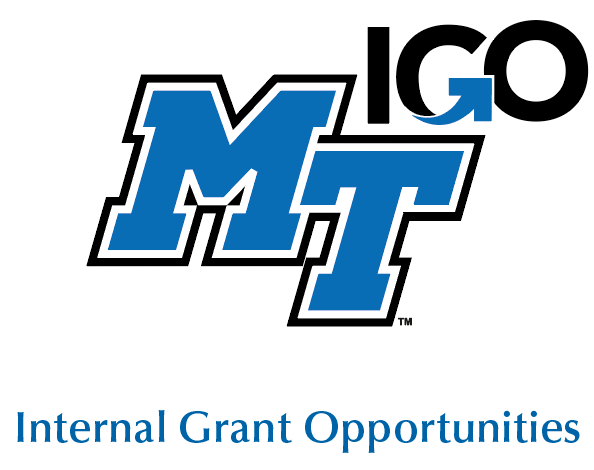MT Internal Grant Opportunities (MT-IGO*) FAQs
If your questions are not answered below, please contact the ORSP Coordinator, Katie
Medrano at Katie.Medrano@mtsu.edu
Types of Grants
What type of grants does the MT-IGO program fund?
MT-IGO offers opportunities in the fields of research and creative activities. For a detailed description of each, please visit the MT-IGO Type of Grants page.
Application and Proposal Guidelines
- MT-IGO offers a complete webpage dedicated to supporting applicants in the application
and proposal process. Please visit the MT-IGO Application and Proposal Guidelines page for information, examples, and resources.
What are the required components when applying for a MT-IGO grant?
There are two components required: (1) an application, and (2) the proposal.
What if I need additional support?
| Katie Medrano |
| Coordinator |
| (615) 904-8040 |
| Katie.Medrano@mtsu.edu |
What is an MT-IGO cycle and when are the deadlines?
The program has two grant-making cycles per year, in September and March. However,
the March submission is reserved for those applicants who were not funded in September
and wish to resubmit their proposal after revision based on committee evaluation.
Fall Session
|
|
|
Applications Open: August 15, 2023
Deadline: September 15, 2023 by 4:30 pm - CLOSED
|
Research funds for 2023/24
|
Spring Session - By invitation only
|
|
|
Applications Open: January 15, 2024
Deadline: March 15, 2024 by 4:30pm - CLOSED
|
Research funds for 2023/24
|
Forms and Documents
How do I apply for a MT-IGO grant opportunity?
Complete and submit an MT-IGO Grant Application. You will need the following information to complete the application: contact information
of the PI, Co-PI (if applicable), Chair and Dean, project summary, proposal budget
and justification, PDF upload of proposal. For detailed information please visit
the MT-IGO Application and Proposal Guidelines page.
What other documents may be needed?
Are there any forms or documents required upon completion of my MT-IGO project?
Upon completion of your MT-IGO project a MT-IGO Final Report Questionnaire** must be submitted within 60 days.
Criteria used in Evaluating Proposals
What is the review process?
MT-IGO adopts a two-step review process to enable individual review by a specialists
as well as holistic review which is conducted by the committee. The final determination
of the proposals recommended for funding will be informed by individual reviews and
the panel summary.
What criteria is used in the evaluation?
Once assigned to a proposal(s), the committee members review them in accordance with
the scoring rubric. If the PI is an established researcher, such as tenured faculty
or full professor, then the reviewers will also evaluate if the proposal offers a
new direction in comparison to the applicant’s ongoing studies. Subsequently, the
reviewers will also evaluate the feasibility of the study's specific aims within the
projected timeline and available resources. The qualification and expertise of the
PI to lead and succeed will also be critically evaluated. Most importantly, the reviewers
will consider if the study has the potential to lend to a competitive proposal for
external funding and to extend the scope and reach of the research agenda.
Eligibility
What is the criteria for MT-IGO eligibility?
MT-IGO applicants must:
- Be regular full-time tenured or tenure-track faculty at MTSU.
- Have received fewer than two previous MT-IGO grants*.
- Have submitted final reports for any previous MT-IGO-funded activity and fulfilled
external funding requirements.
- Have not received a MT-IGO grant* in the past five years.
*including FRCAC grant(s)
Budget Guidelines
- MT-IGO offers a complete webpage dedicated to supporting applicants in the budget
preparation process. Please visit the MT-IGO Budget Guidelines page* for information, examples, and resources.
When is a proposal budget necessary?
This section is required if the PI is requesting funding for any of the following:
- Personnel such as a student worker, graduate assistant, transcriptionist, etc.
- Equipment over $500
- Travel including mileage/flight, lodging, per diem
- Operational Costs such as supplies/materials, publication fees, consultant fees, etc.
If the project involves multiple PIs, do we each need to sign the form.
- Yes, the dynamic form will route to the Co-PI for signature.
Responsibilities and Expectations
What are the responsibilities and expectations for a MT-IGO recipient?
- Follow all University procedures in connection with the proper and timely disbursement
and accounting of funds and the completion of the necessary paperwork. Manage transactions and keep up with account balances.
- Complete and submit the award acceptance form within 30 days from the issuance of the award notification.
- Submit a formal petition to MT-IGO if addition time is required to complete the project.
- Immediately submit changes or revisions that require budgetary changes to MT-IGO.
- Recipients must submit a final report within 60 days of the project's completion.
- Recipients must submit an application for the three external grant opportunities listed
on their MT-IGO application.
- Acknowledge funding by the MT Internal Grant Opportunities (MT-IGO) program on articles
submitted for publication and/or presentations of creative works.
- Follow intellectual property guidelines (see MTSU's IP Policy).



